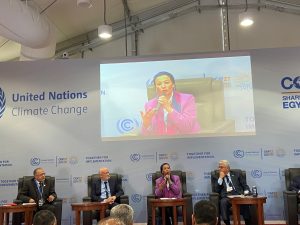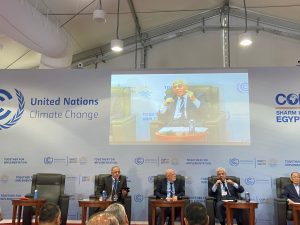ESA at COP27: Science Day
ESA Member Morgan L. Rogers attended the first week of the United Nations Conference of Parties (COP 27) in Sharm El-Sheikh, Egypt using a official observer badge from ESA. Rogers is a Ph.D. student at the University of California, Los Angeles, based in the Urban Planning Department and the Luskin Center for Innovation. She shares the following observations from COP27’s Science Day. For more updates from Morgan at COP 27, see her Twitter page.
Session: IPCC Sixth Assessment Report: How to Accelerate Global Climate Action
Speakers: Dr. Yasmine Fouad, Minister of Environment – Egypt; Ayman Ashour, Minister of Higher Education and Scientific Research – Egypt; Dr. Hoesung Lee, Chair of the Intergovernmental Panel on Climate Change (IPCC)
Summary of session:

Egyptian Minister of the Environment Dr. Yasmine Fouad participates in a panel at COP 27.
Dr. Fouad, Minister of Environment for Egypt, kicked off the session by welcoming everyone and
stating the importance of using science to inform implementation efforts. She has worked to
mainstream knowledge on climate change and solutions for mitigation and adaptation in Egypt. Also, she was proud to announce that her government is launching the first ever vulnerability assessment in Egypt. Following her announcement, Ayman Ashour, Minister of Higher Education and Scientific Research for Egypt, spoke about the efforts being made in his department to integrate SDGs into university curriculum. The goal is to prepare all of their students to be knowledgeable and able to work on implementing SDGs through their respective fields. Dr. Hoesung Lee, Chair of the IPCC, closed out the session by calling for an acceleration on global climate action because as it stands we are not on track to stay below 1.5 degrees celsius. He remarked that while adaptation implementation is important it will not be very effective if we are not able to stay below 1.5 C. He argued that we must have aggressive mitigation efforts in order for our adaptation plans to be successful.
Session: Uniting Global Scientific Research: Efforts to Tackle Climate Change
Speakers: Dr. Alex Halliday, Director of Earth Institute at Columbia University; Dr. Keen, member of an IPCC committee; Ayman Ashour, Minister of Higher Education and Scientific Research.
Summary of Session:
Ayman Ashour, Minister of Higher Education and Scientific Research, discussed the efforts being
made in Egypt to unite science, policy and the private sector. He emphasized that his ministry is
working to support collaborative projects between universities, private companies, and policy
makers. The panelists stated that they are building on the Adaptation Research Alliance that was
launched on Science Day during COP26 by emphasizing the importance of interdisciplinary research and the co-creation of solutions with government and civil society. Also, they recognize a gap in actionable research in the global south and are pushing to support more scientists in

Dr. Alex Halliday (Columbia University), Dr. Hoesung LEe (IPCC) and Egyptian Minister of the Higher Education and Scientific Research Participate in a panel at COP 27.
global south. Dr. Halliday of the Earth Institute at Columbia argued that research must be translated into actionable policy, that education should be a public good, and that we must collaborate with different disciplines and build partnerships with practitioners, policy makers, and civil society. Dr. Keen of the IPCC supported these points and argued that governments are typically not good at thinking long-term or designing implementation approaches to climate adaptation, which means scientists need to package their research in a way that works for politicians and governments. He stated that we need to make clear what needs to be done and we need to link the long-term impacts of climate change to near-term actions. All of the panelists called for pragmatism in translating research into actionable policy as we need global climate action now